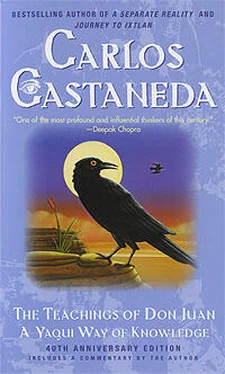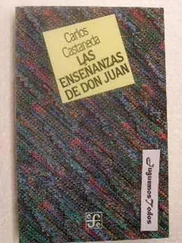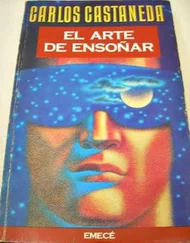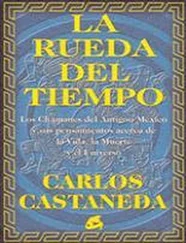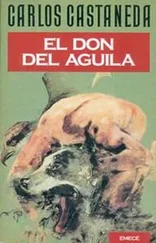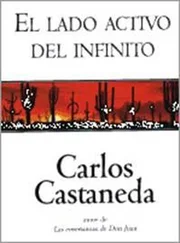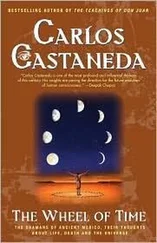Reality of special consensus
The main body of don Juan's teachings, as he himself stated, concerned the use of the three hallucinogenic plants with which he induced states of non-ordinary reality. The use of these three plants seems to have been a matter of deliberate intent on his part. He seems to have employed them because each of them possessed different hallucinogenic properties, which he interpreted as the different inherent natures of the powers contained in them. By directing the extrinsic and intrinsic levels of non— ordinary reality, don Juan exploited the different hallucinogenic properties until they created in me, as the apprentice, the perception that non-ordinary reality was a perfectly defined area, a realm separate from ordinary, everyday life whose inherent properties were revealed as I went along.
Nevertheless, it was also possible that the allegedly different properties might have been merely the product of don Juan's own process of directing the intrinsic order of non-ordinary reality, although in his teachings he exploited the idea that the power contained in each plant induced states of non-ordinary reality which differed from one another. If the latter was true, their differences in terms of the units of this analysis seem to have been in the range of appraisal which one could perceive in the states elicited by each of the three. Owing to the peculiarities of their range of appraisal, all three contributed to producing the perception of a perfectly defined area or realm, consisting of two compartments: the independent range, called the realm of the lizards, or of Mescalito's lessons; and the dependent range, referred to as the area where one could move by one's own means.
I use the term 'non-ordinary reality', as already noted, in the sense of extraordinary, uncommon reality. For a beginner apprentice such a reality was by all means unordinary, but the apprenticeship of don Juan's knowledge demanded my compulsory participation and my commitment to pragmatic and experimental practice of whatever I had learned. That meant that I, as the apprentice, had to experience a number of states of non— ordinary reality, and that firsthand knowledge would, sooner or later, make the classifications 'ordinary' and 'non-ordinary' meaningless for me. The bona fide adoption of the first unit of the conceptual order would have entailed, then, the idea that then was another separate, but no longer unordinary, realm of reality, the 'reality of special consensus'.
Accepting as a major premise that the reality of special consensus was a separate realm would have explained meaningfully the idea that the meetings with the allies or with Mescalito took place in a realm that was not illusory.
The reality of special consensus had pragmatic value The same process of directing the extrinsic and intrinsic levels of non-ordinary reality, which seemed to have created the recognition of the reality of special consensus as a separate realm, appeared also to have been responsible for my perception that the reality of special consensus was practical and usable. The acceptance of special consensus on all the states of non-ordinary reality, and on all the special states of ordinary reality, was designed to consolidate the awareness that it was equal to the reality of ordinary, everyday-life consensus. This equality was based on the impression that the reality of special consensus was not a realm that could be equated with dreams. On the contrary, it had stable component elements that were subject to special agreement. It was actually a realm where one could perceive the surroundings in a deliberate manner. Its component elements were not idiosyncratic or whimsical, but concise items or events whose existence was attested to by the whole body of teachings.
The implication of the equality was clear in the treatment don Juan accorded to the reality of special consensus, a treatment that was utilitarian and matter of course; not at any time did he refer to it, nor was I required to behave towards it in any but a utilitarian, matter-of-course way. The fact that the two areas were considered equal, however, did not mean that at any moment one could have behaved in exactly the same way in either area. On the contrary, a sorcerer's behaviour had to be different since each area of reality had qualities that rendered it utilizable in its own way. The defining factor in terms of meaning seems to have been the idea that such an equality could be measured on the grounds of practical utility. Thus, a sorcerer had to believe that it was possible to shift back and forth from one area to the other, that both were inherently utilizable, and that the only dissimilarity between the two was their different capacity for being used, that is, the different purposes they served.
Yet their separateness seemed to be only an appropriate arrangement that was pertinent to my particular level of apprenticeship, which don Juan used for making me aware that another realm of reality could exist. But from his acts, more than from his statements, I was led to believe that for a sorcerer there was but one single continuum of reality which had two, or perhaps more than two, parts from which he drew inferences of pragmatic value. The bona fide adoption of the idea that the reality of special consensus had pragmatic value would have given a meaningful perspective to movement.
If I had accepted the idea that the reality of special consensus was usable because it possessed inherently utilizable properties which were as pragmatic as those of the reality of everyday consensus, then it would have been logical for me to understand why don Juan exploited the notion of movement in the reality of special consensus at such great length. After accepting the pragmatic existence of another reality, the only thing a sorcerer had to do would be to learn the mechanics of movement. Naturally, movement in that instance had to be specialized because it was concerned with the inherent, pragmatic properties of the reality of special consensus.
The issues of my analysis have been the following:
1. The fragment of don Juan's teachings which I have presented here consisted of two aspects: the operative order or the meaningful sequence in which all the individual concepts of his teachings were linked to one another, and the conceptual order or the matrix of meaning in which all the individual concepts of his teaching were embedded.
2. The operative order had four main units with their respective component ideas: (1) the concept 'man of knowledge'; (2) the idea that a man of knowledge had the aid of a specialized power called an ally; (3) the idea that an ally was governed by a body of regulations called the rule; and (4) the idea that the corroboration of the rule was subject to special consensus.
3. These four units were related to one another in the following manner: the goal of the operative order was to teach one how to become a man of knowledge; a man of knowledge was different from ordinary men because he had an ally; an ally was a specialized power, which had a rale; one could acquire or tame an ally through the process of verifying its rule in the realm of non-ordinary reality and through obtaining special consensus on that corroboration.
4. In the context of don Juan's teachings, becoming a man of knowledge was not a permanent accomplishment, but rather a process. That is to say, the factor that made a man of knowledge was not solely the possession of an ally, but the man's lifelong straggle to maintain himself within the boundaries of a system of beliefs. Don Juan's teachings, however, were aimed at practical results, and his practical goal, in relation to teaching how to become a man of knowledge, was to teach how to acquire an ally through learning its rale. Thus the goal of the operative order was to provide one with special consensus on the component elements perceived in non-ordinary reality, which were considered to be the corroboration of the ally's rule.
Читать дальше
